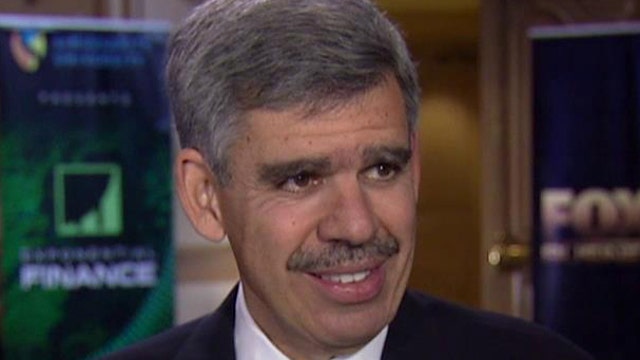Allianz's El-Erian Says Stock Valuations 'High'
Mohamed El-Erian, chief economic adviser for financial services giant Allianz, said Wednesday that any disruption to the long-running U.S. economic recovery would likely stem from forces outside the U.S.
“If we get disrupted, it's going to be because of something that happened outside, in particular in Europe,” El-Erian told Fox Business Network’s Maria Bartiromo during a Q&A at SALT conference in Las Vegas. “So the underlying strength of this economy is high, but it's still exposed to the rest of the world.”
El-Erian, who serves as chair of President Obama's Global Development Council, said investors should maintain flexibility in these unpredictable economic times.
“For financial investors, take a bit of money off the table right now and give yourself the optionality, give yourself the agility to respond because prices have been decoupled quite a bit from fundamentals and liquidity risks are underappreciated,” he said.
“And just keep your powder dry and be much more barbelled, more cash and more in the high-risk, illiquid -- by illiquid, I mean startups, things like that, hedge funds, and be careful of the public markets that have been pushed really high by central banks,” El-Erian added.
El-Erian, echoing comments made this morning in Washington, D.C., by Federal Reserve Chair Janet Yellen, said U.S. stock markets may be a bit frothy.
“So because of liquidity it could be quite significant. Let's not underappreciate the extent to which people have wired to buy on a dip, buy on a dip, buy on a dip because it has worked. But I worry about valuations are so high right now that the liquidity concerns may trump the buy on a dip in the beginning,” he said.
El-Erian said Europe seems to be in better condition than it was late in 2014, when it appeared as if troubles in Greece could throw the entire 17-member eurozone back into turmoil.
“So the mood as a whole is better,” he said. “People believe that the eurozone is benefitting from the weaker exchange rate, from QE and from the oil prices.
He added that the possibility still exists that Greece could leave the eurozone, but that the economy would survive such a rift.
“There's now much more realism towards Greece. People realize that Greece is going to be really hard to solve and that we are looking at a potential accident, but they're not as worried -- and rightly so because Europe has taken major steps to protect itself from Greek contagion.”
“If Greece leaves it's because of a massive accident. The positive outflows, capital controls, an alternative IOU currency, that's what it's going to look like, a little bit like Argentina in December 2001,” he said.
Those are the circumstances under which Greece leaves. Messy in the short term, but containable over the medium and long term.




















